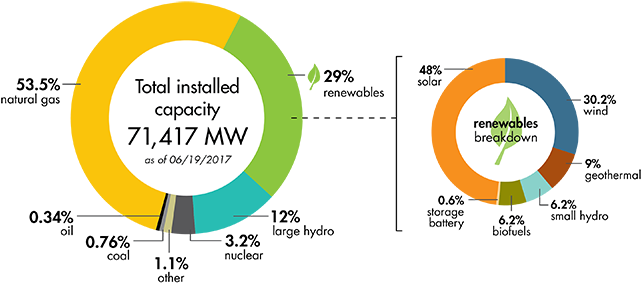Forum Discussion
valhalla360
Nov 01, 2017Navigator
time2roll wrote:SidecarFlip wrote:The thread is about Brent Crude.
Not to initiate a supply chain discussion but, electric vehicles really don't eliminate fossil fuel consumption, they just move the point of fueling from the pump, to the fossil fueled power plant. The exception is, of course a nuclear fueled power plant but then you have the issue of radioactive spent fuel disposal.
And yes I also hope the utilities continue to move toward solar energy.
I have 3kW of solar on my house producing about 5,000 kWh each year.
California is currently at 29 percent renewables. 41 percent if large hydro is included as renewable.
There's a big problem with that 29% number when you assume your power is coming from sunshine and daisies.
It's "installed capacity" not "production capacity". The difference:
- If you install 1 MW of traditional power plant, you can generate 24MW-Hrs per day. Because demand isn't steady, it may be ramped back and only generate 15-20MW-Hrs per day.
- If you install 1 MW of solar, on a good day, you might get 4-5MW-Hrs per day. If it's an overcast day in the winter, that could be cut by 50-75%...or more.
So the realistic daily production is 1/4-1/3 what a traditional plant will produce.
Even worse, when sizing the overall system, the peak period determines the grid design and the production plant sizing. That occurs early evening when solar puts out nothing.
So until someone comes up with cost effective battery banks, solar is largely a feel good solution that doesn't change much.
Wind is better but faces some of the same issue but to a lesser degree (ie: wind can produce during the peak period but is still highly variable and you can't count on the rated output).
Geothermal/Hyrdro/Waste to Energy, those are all more viable but you can't just put them anywhere in unlimited quantities.
- If you don't have a river or other water course, you can't put in hydro. California is running into this issue the recent drought where production from dams had to be reduced to retain water supplies.
- Waste to Energy works great on a small scale but there is only so much waste to burn. There was a big thing about fast food waste oil a few years back, the problem is all of it combined is only a small fraction of a percent of demand.
That's not to say it's not a net improvement but talking about installed capacity is highly misleading.
- Even with Coal, there is an advantage. The USA has something like 500yrs worth of coal reserves and modern coal plants produce very little pollution. So if we run electric cars off coal-electric, we move away from OPEC.
About Technical Issues
Having RV issues? Connect with others who have been in your shoes.24,343 PostsLatest Activity: Dec 16, 2025
